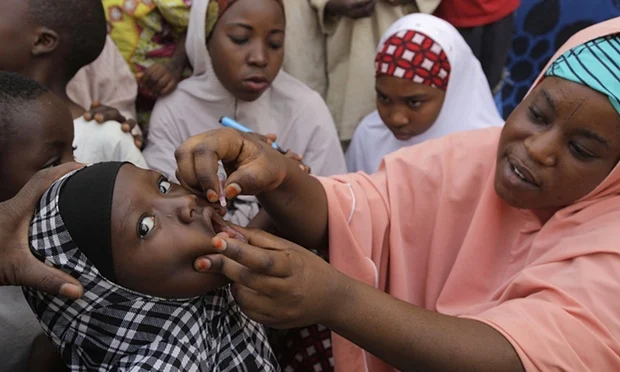Immunization remains one of the most effective public health interventions worldwide, saving millions of lives each year. In Nigeria, the importance of immunisation cannot be overstated as the country grapples with a high burden of vaccine-preventable diseases (VPDs) such as measles, polio, and tetanus.
Based on figures from the 2021 Multiple Indicator Cluster Survey/National Immunization Coverage Survey (MICS/NICS), there are approximately 36 million children under the age of five in Nigeria, with about 2.3 million of them never receiving a single dose of routine vaccines, putting them at risk of preventable diseases and death.
Chief of the United Nations Children’s Fund (UNICEF) Field Office, South West Nigeria, Celine Lafoucriere, who disclosed this at a media dialogue on routine immunization, said vaccine remains essential to children’s health, as it is a fundamental human right.
Lafoucriere decried that about 2.3 million Nigerian children have not receive a single dose of vaccine, while calling on stakeholders to bridge the gap.
In its contribution to bridging the gap, the Lagos field officer, said UNICEF is partnering with the federal government to prioritise 100 local governments across 18 states with the highest concentration of zero-dose children to boost immunisation uptake and close the gap of 2.3 million unvaccinated Nigerian children.
The chief of the UNICEF Field Office for the Southwest further called for media support to raise awareness about the importance of vaccines, tackle misconceptions, and encourage vaccine uptake through their reports.
She said, “Your influence is very important. You can catalyse actions, and help dispel rumors and misinformation about vaccines. By working collectively, we can build a resilient health system that is capable of reaching each and every child, leaving no one behind. No matter where they live, we must ensure that no child in Nigeria suffers from preventable diseases,” she added.
The UNICEF social behaviour change communication specialist, Aderonke Akinola-Akinwole, noted that low immunisation uptake was fueling the country’s child mortality rate, amid 2.3 million children that had yet to receive vaccines in Nigeria.
Akinola-Akinwole emphasised the importance of immunisation in saving millions of lives of Nigerian citizens and the need for the governments to intensify their efforts toward achieving universal immunisation coverage.
While Nigeria has made progress in some child health-related indicators, such as reducing the under-five mortality rate from 182 deaths per 1,000 live births in 2000 to 111 deaths per 1,000 live births in 2021, additional efforts will be needed for the country to meet most of the child-related Sustainable Development Goal (SDG) indicators by 2030.
Akinola-Akinwole listed the challenges fuelling zero-dose children in Nigeria, as inadequate health facilities; long travel time to access available facilities; security compromised areas and Japa syndrome among others.
Speaking further on inadequate health facilities, the managing director/chief executive officer, Private Sector Health Alliance of Nigeria (PSHAN), Tinuola Akinbolagbe told LEADERSHIP that Nigeria’s primary health care (PHC) facilities have been in steady decline, with only 20 percent of the 30,000 PHC facilities across Nigeria fully functional.
Despite her rich potential and abundant resources, Nigeria grapples with hurdles in providing equitable, accessible, and affordable healthcare to its people, Akinbolagbe averred.
“Inadequate primary healthcare infrastructure, limited access to essential healthcare services and persistent health inequalities highlight the urgent need for concerted action. Our statistics on maternal mortality, infant mortality, communicable and non- communicable diseases further emphasize the need for systemic reform and strategic intervention,” Akinbolagbe highlighted.
Yet, amidst these challenges lies an opportunity to forge transformative partnerships, galvanize collective action, and chart a course towards sustainable change, the CEO stated, adding that, PSHAN has come up with this initiative: Adopt a Health facility Programme (ADHFP).
The ADHFP was launched with an innovative financing mechanism, aimed at establishing globally standardized Primary Healthcare Centres (PHCs) across Nigeria’s 774 Local Government Areas with the support of adopters and strategic lartners.
The initiative embodies PSHAN ‘s collective resolve to bridge the gap between healthcare demand and supply, empower local communities, rebuild trust in the Nigerian healthcare system and catalyze systemic change at the grassroots, she revealed.
Harping on the partnership, Akinbolagbe disclosed that PSHAN embarked on this journey with a profound sense of purpose and urgency, adding that. “As we roll out and activate new PHCs across Nigeria in partnership with our Adopters and Partners, we have already made notable strides in the health indices of the communities we serve, and we seek to accelerate this progress. Together, we have the power to shape a future where healthcare is not merely a privilege but a fundamental human right, accessible to all, irrespective of socio-economic status or geographical location.”






